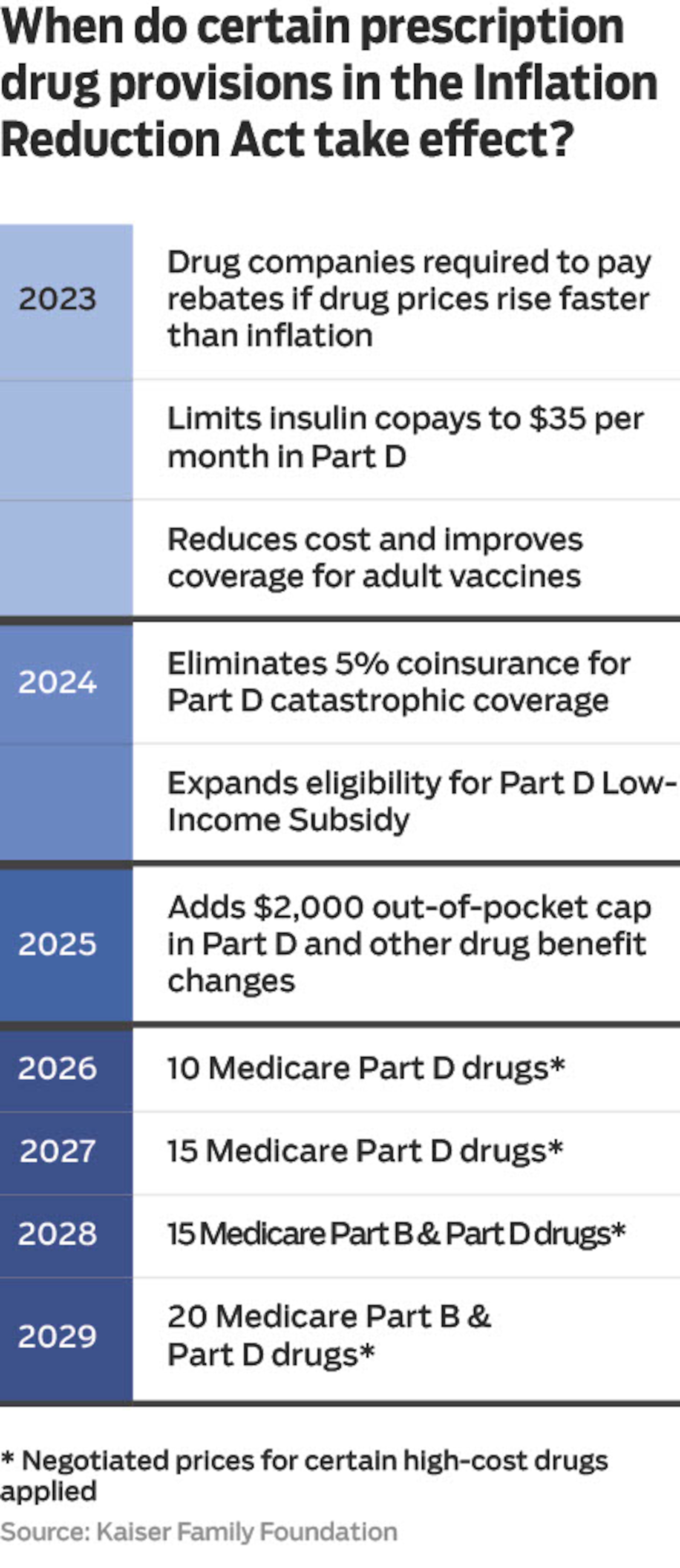Here’s what to expect from Medicare this year
As the enrollment periods for Medicare plans approach, eligible Atlanta residents likely have questions.
Inevitable changes for premiums, deductibles and coverage can mean confusion — and possibly some angst — for those signing up for the first time or needing to make changes. Fortunately, there are resources to which those who need help navigating the enrollment process can turn.
Here’s what to expect from Medicare next year and some ways to find help negotiating the choices that come with enrolling in a plan.
Enrollment
Most eligible people sign up for Medicare Part A and Medicare Part B, which are hospital insurance and medical insurance, respectively, according to Medicare.gov, a basic jumping-off point for those seeking definitions and answers. Medicare Advantage plans are also sometimes called Medicare Part C. Medicare Advantage coverage includes Medicare Parts A and B, but also comes with extras. The types of extras are different depending on the plan. Medicare Advantage plans are offered through private companies that the Medicare agency approves.
One type of extra is often drug coverage, under Medicare Part D. You can buy a standalone drug plan, or a Medicare Advantage plan that includes the basic Part A and Part B plans as well as Medicare Part D.
Beware: Medicare parts A and B alone mostly do not cover drugs. If you want drug coverage, you’ll have to buy additional drug coverage.
In addition, if you’re waffling on drug coverage and think you may wait and just buy it later, think twice: You’ll end up paying a big penalty for waiting. You avoid the penalty by buying the drug coverage as soon as you become eligible for it.
Would-be beneficiaries enter their initial seven-month enrollment period three months prior to their 65th birthday, according to the site. Coverage start dates vary depending on when enrollees sign up and which plans they select.
Eligible people can sign up, make changes or switch plans at various points in the year. The yearly open enrollment period from Oct. 15 to Dec. 7 allows all Medicare enrollees to change health and/or drug coverage for the coming year, according to the Centers for Medicare & Medicaid Services.

Medicare Advantage enrollees may also change to another Advantage plan or to Original Medicare during the general enrollment period from Jan. 1 to March 31, according to Medicare.gov. It’s also a time when those who qualify and missed their initial eligibility period can enroll in Medicare parts A, B or both, the National Council on Aging said.
Special situations, including a change in living situation or loss of current coverage can also trigger special enrollment periods.
Premiums and deductibles
According to a CMS report earlier this year, Medicare Part B premiums for 2023 may be lower than expected at the recommendation of the CMS because of a drop this past year in the price of Aduhelm, a drug used in Alzheimer’s disease treatment. The previous price of the drug affected the 2022 premium amount. According to cms.gov, the Medicare Part B standard monthly premium was $148.50 with an annual deductible of $203 in 2021. That premium amount rose to $170.10 with an annual deductible of $233 for 2022, Medicare.gov said.
Medicare Part A beneficiaries saw their deductibles rise once again this past year. They paid a $1,556 deductible cost per benefit period, according to the CMS; this cost is up $72 from $1,484 in 2021 and from $1,408 in 2020.
The average Medicare Part D premium also climbed in 2022. According to the CMS, the current average premium for standard coverage is $32.08, up from $31.47 in 2021. But information on cms.gov projects that number to drop to $31.50 in 2023. Drug coverage max deductibles, the CMS said, will go up $25 from $480 in 2022 to $505 in 2023.
Notable continuations, changes and proposals
The Inflation Reduction Act, which President Biden signed into law in August, will aid Medicare drug coverage beneficiaries who use covered insulin products in keeping their costs lower than in recent years. The bill, accessible on Congress.gov, states that for 2023 through 2025, cost sharing for covered insulin products will not exceed $35 per month. The bill holds that for 2026, this cost-sharing amount will be equal to the least of one of three scenarios: 25% of the negotiated cost for plans for the government or $35.
Hospital closures in rural areas, along with closures of critical access hospitals, have produced a shortage in care for surrounding areas, according to cms.gov, and as a result, the agency has worked to establish rules for a new provider type for Medicare. Rural Emergency Hospitals, the site says, will go into effect Jan. 1, 2023. The new provider type is a result of the Consolidated Appropriations Act. Critical access hospitals or rural hospitals that convert to REHs will not provide acute care for inpatients and will contain fewer than 50 beds, according to the CMS, and there will be distinct part units with services from skilled nursing staff.

Behavioral health services via telehealth will remain available for many current patients, according to a July 15 proposal from the CMS for 2023. Hospitals Without Walls, the current policy that allows for the service, is actually an emergency waiver, and it will expire when COVID-19 is no longer considered a public health emergency, cms.gov said. The proposal suggests that telehealth behavioral health services from hospital outpatient department clinical staff be classified as covered outpatient services.
Help is at hand
Online stats and definitions from official sources can be a jumping-off point or a way to get more detailed information, but when it comes time to enroll, many people want more specific guidance.
One option is the Georgia State Health Insurance Assistance Program, which those looking to enroll can call for help — and it’s free. People with questions are directed toward the service from the Atlanta Regional Commission.
“We refer consumers with Medicare questions to the Georgia State Health Insurance Assistance Program … Georgia SHIP provides free, unbiased, one-on-one counseling and assistance to Medicare beneficiaries, their families, friends and caregivers,” said Becky Kurtz, managing director of Aging & Independence Services at the Atlanta Regional Commission.
“It’s important for consumers to investigate their health insurance options and gather accurate information so they can make decisions that can prevent serious, costly problems. Many consumers are unaware that Georgia has SHIP.”
Those with questions may find contact information for Georgia SHIP at aging.georgia.gov/georgia-ship.
The American Association of Retired Persons also offers resources that can help with coverage choices. Those interested just need computer access and a little time.
“AARP offers a free-of-charge online learning series to assist people with researching Medicare options,” Hillary Williams Thomas, AARP Georgia Associate State Director for Advocacy and Community Outreach, said.
Medicare users can peruse learn.aarp.org for more Medicare information, including the Medicare Made Easy section of the organization’s Medicare Resource Center.
“Reaching out for help can prevent people from becoming frustrated with the process,” Thomas said. “In deciding what options are best when it comes to Medicare options, you can be inundated with all of the many acronyms and confusion of ‘Part A, B and D. AARP’s resources can give you the information you need and/or lead you to the right people for help around Medicare programs.”

Help in the coming years
The Inflation Reduction Act will aid those who receive Medicare drug benefits in a number of ways in the coming years. The following is a brief synopsis of some of these developments:
- Effective for 2023: There will be no cost-sharing for Advisory Committee on Immunization Practices-recommended adult vaccines for Medicare enrollees who receive prescription drug benefits.
- Effective for 2023: Drug makers must supply rebates to the Centers for Medicare & Medicaid Services in instances where drug price increases exceed the rate of inflation. While there doesn’t appear to be a specific start date, KFF.org reported it begins next year.
- Effective for 2024: Medicare enrollees who receive prescription drug benefits will not be responsible for out-of-pocket costs after reaching the Catastrophic Coverage Period. That threshold, according to the CMS, is $7,400 for 2023, with a 5% drug cost coming from beneficiaries after that point.
- Effective for 2025: Medicare enrollees who receive prescription drug benefits can expect a cap of $2,000 on out-of-pocket spending.
- Effective in 2026: The CMS will negotiate the highest limits on prices where certain covered, brand-name medications do not have generic counterparts. These negotiations will encompass the following numbers of Medicare Part D drugs in the coming years: 10 in 2026, 15 in 2027 and 2028, and 20 in 2029 and subsequent years. Medicare Part B will be included beginning in 2028 and 2029.
- Delayed until 2032: the implementation of a rule that would take away anti-kickback protections for rebates from drug makers to pharmacy benefit managers.
To get specialized news and articles about aging in place, health information and more, sign up for our Aging in Atlanta newsletter.

